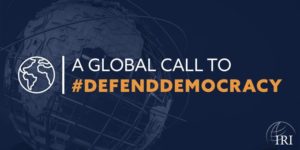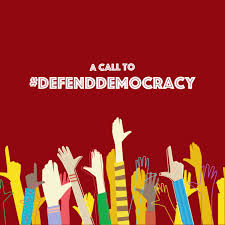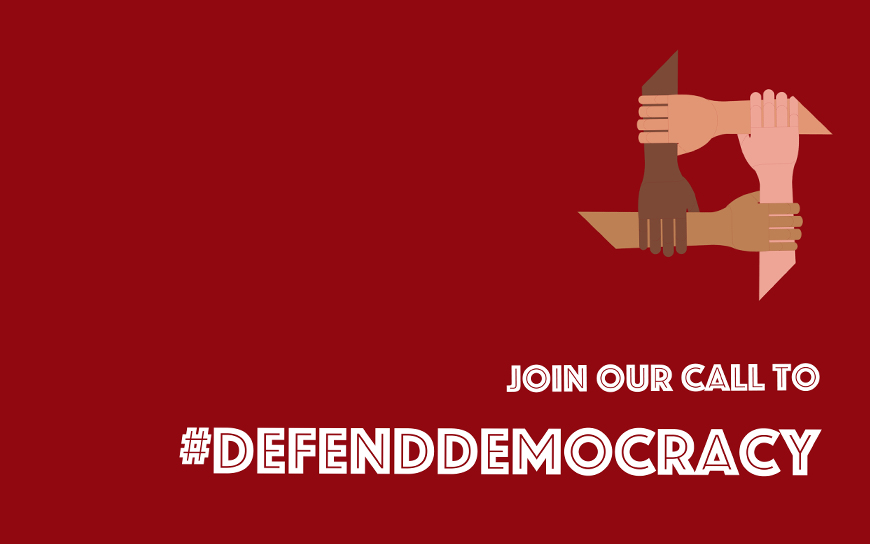The outbreak of Covid-19 and subsequent pandemic has led to an alarming uptick in authoritarian behavior by governments across the globe, who are using the crisis to silence critics, an open letter signed by more than 500 former world leaders and Nobel Laureates claims, CNN reports.
The pandemic poses serious threats to democracy, according to “A Call to Defend Democracy”, an Open Letter initiated by the Stockholm-based International IDEA and the US-based National Endowment for Democracy. The letter is signed by some 73 pro-democracy institutions as well as a roll call of global political and civic leaders, including 13 Nobel Laureates and 62 former heads of state and government.

Former Secretary of State Madeleine Albright. Credit: NDI
“Authoritarian regimes, not surprisingly, are using the crisis to silence critics and tighten their political grip. But even some democratically-elected governments are fighting the pandemic by amassing emergency powers that restrict human rights and enhance state surveillance without regard to legal constraints, parliamentary oversight, or timeframes for the restoration of constitutional order,” the letter states.
“Parliaments are being sidelined, journalists are being arrested and harassed, minorities are being scapegoated, and the most vulnerable sectors of the population face alarming new dangers as the economic lockdowns ravage the very fabric of societies everywhere.”
The letter’s signatories include former Secretary of State Madeleine Albright, former Vice President Walter Mondale, former Trump national security adviser H.R. McMaster, former U.S. Sens. Tom Daschle and Gary Hart, former Florida Gov. Jeb Bush, former House Majority Leader Richard Gephardt, and Hollywood actor Richard Gere. Nobel Prize winners José Ramos-Horta and Svetlana Alexievich, former Swedish Prime Minister Carl Bildt and leaders from many countries also signed.
 “This unprecedented demonstration of global solidarity is a sign that democracy, while threatened, is also resilient,” says NED President Carl Gershman (above), one of the signatories.
“This unprecedented demonstration of global solidarity is a sign that democracy, while threatened, is also resilient,” says NED President Carl Gershman (above), one of the signatories.
COVID-19 represents what you might call a battle of narratives between authoritarian countries and democracies, Gershman told Forum 2000 (above). Democracies are going through a real crisis and the pandemic sharpens that crisis.
The letter draws a connection between China as the birthplace of the pandemic and the country’s authoritarian regime, “where the free flow of information is stifled and where the government punished those warning about the dangers of the virus,” POLITICO adds.
Since the pandemic began, dozens of countries have introduced emergency declarations and more than 100 have brought in measures that affect public assembly, such as protests against the state, according to the International Center for Non-Profit Law’s Covid-19 Civic Freedom Tracker. Their cited examples range from restricting access of public information to arresting citizens for “provocative” posts on social media, CNN adds.
 The letter aims to raise awareness and mobilize citizens and policymakers to defend democracy – the most effective system for handling global crises while protecting citizens’ rights.
The letter aims to raise awareness and mobilize citizens and policymakers to defend democracy – the most effective system for handling global crises while protecting citizens’ rights.
“The current pandemic represents a formidable global challenge to democracy. Authoritarian leaders around the world see the COVID-19 crisis as a new political battleground in their fight to stigmatize democracy as feeble and reverse its dramatic gains of the past few decades,” the letter states.
“On the contrary,” it says, “these assaults on freedom, transparency, and democracy will make it more difficult for societies to respond quickly and effectively to the crisis through both government and civic action.”
 Robust authoritarian governments appear better placed than democracies to implement unpopular reforms effectively, so it might seem that they have a better chance of tackling crises such as a pandemic, climate change or environmental deterioration, Ingmar Persson and Julian Savulescu observe in Unfit for the Future: The Need for Moral Enhancement. However, history shows that the unpopular policies implemented by authoritarian regimes more often serve to consolidate the power of the ruling elite, or to enrich it, than promote the interest of societies overall.
Robust authoritarian governments appear better placed than democracies to implement unpopular reforms effectively, so it might seem that they have a better chance of tackling crises such as a pandemic, climate change or environmental deterioration, Ingmar Persson and Julian Savulescu observe in Unfit for the Future: The Need for Moral Enhancement. However, history shows that the unpopular policies implemented by authoritarian regimes more often serve to consolidate the power of the ruling elite, or to enrich it, than promote the interest of societies overall.
“Now is the time when all of us must stand up for democracy. We need to make it clear to everyone what is at stake and that we will not allow leaders with authoritarian tendencies to use this or other crises to increase their power and decrease our rights. We need to defend democracy—whether in the ballot box, in the media or on the streets. This is what the letter is about,” says Kevin Casas-Zamora, Secretary-General of International IDEA.
“Just as the pandemic is already having massive economic and social consequences, it is very likely already having very profound political consequences,” he told AFP.
While it is unsurprising that authoritarian regimes are using the crisis to tighten their grip on power, some democracies have also introduced emergency powers without the necessary safeguards to ensure measures can be rolled back, the letter says.
 The pandemic and the global movement for racial equality have shown that democracy is more important than ever.
The pandemic and the global movement for racial equality have shown that democracy is more important than ever.
Democracy allows for civil society to mobilize, for inequalities to be confronted, for policy issues to be openly debated, for trustworthy information to flow freely, and governments to be accountable to citizens—all essential tools for successfully dealing with the current public health emergency and its consequences.
Read the full statement here. Find the list of signatories here. Please promote the #DefendDemocracy statement through your social media networks.








